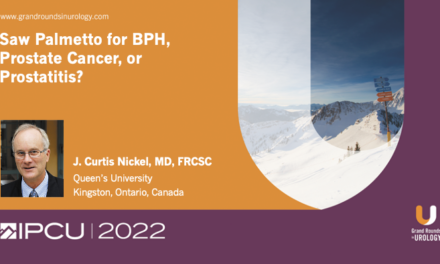Christopher J. Kane, MD, FACS, presented “Germline Screening and Polygenic Risk Scores” during the 30th Annual Perspectives in Urology: Point-Counterpoint, on March 10, 2023, at Humphreys Half Moon Inn, San Diego, California.
How to cite: Kane, Christopher J. “Germline Screening and Polygenic Risk Scores.” March 10, 2023. Accessed Jun 2025. https://grandroundsinurology.com/germline-screening-and-polygenic-risk-scores/
Germline Screening and Polygenic Risk Scores – Summary
Christopher J. Kane, MD, FACS, provides a comprehensive overview of genetic testing in prostate cancer. He emphasizes the importance of distinguishing somatic mutations from germline mutations, and explains the concept of high-penetrance genomic syndromes.
Dr. Kane highlights that genetic testing can be done on various tissues, with cheek swabs and blood tests being the most common methods. He identifies common genetic changes, such as BRCA2, and mentions testing companies like Invitae, Color, and Foundation.
The discussion also covers the significance of single nucleotide polymorphisms (SNP) in non-coding regions of DNA and their role in inherited mutations. Dr. Kane discusses the criteria for testing, including personal or family history suggestive of an inherited syndrome, test validity, and its impact on patient care.
He underscores the relevance of genomic testing for advanced prostate cancer patients, as actionable therapeutics are available for those with DNA repair gene abnormalities. Dr. Kane refers to the Pritchard article, which revealed a higher frequency of genomic syndromes in men with metastatic prostate cancer than previously estimated. Dr. Kane concludes by acknowledging the limitations of family history and the superiority of SNP testing as a predictor of prostate cancer risk.
About the 30th Annual Perspectives in Urology: Point Counterpoint conference: Presented by Program Chair and Grand Rounds in Urology Editor-in-Chief E. David Crawford, MD, this conference brought together leading experts in urology, medical oncology, and radiation oncology to discuss and debate the latest topics in genitourinary cancers, primarily prostate cancer and bladder cancer. This interactive conference offered topical lectures, pro/con debates, interesting-case presentations, interactive panel discussions, and interactive audience and faculty networking.
ABOUT THE AUTHOR
Christopher J. Kane, MD, FACS, is Dean of Clinical Affairs at the University of California (UC), San Diego School of Medicine. He is also Chief Executive Officer (CEO) of UC San Diego Health Physician Group and Professor of Urology at UC San Diego Health. Dr. Kane is on the Executive Governing Board of UC San Diego Health Sciences and the Executive Committee of UC San Diego’s Clinical Integration Network. In addition, he is the president of the Western Section American Urological Association (AUA) and trustee of the American Board of Urology (ABU).
Dr. Kane is an internationally recognized expert in prostate cancer and kidney cancer epidemiology, risk stratification, and outcomes after treatment. He completed his urology residency at Oakland Naval Hospital and UC San Francisco. Dr. Kane earned his medical degree at Uniformed Services University in Bethesda, Maryland, and his BS degree in mechanical engineering at UC Davis. From 2009 to 2016, he was Co-Chair of the Renal Cell Carcinoma Advisory Task Force, National Cancer Institute. Dr. Kane is on the AUA guidelines in prostate cancer committee and was elected to the American Association of Genitourinary Surgeons (AAGUS) in 2014. In 2017 Dr. Kane was elected to the Clinical Society of Genitourinary Surgeons (GSGUS). He was selected as a “Top Doctor” in San Diego in 2008-2022. In 2010, he was selected as one of two Physician Healthcare Champions in San Diego by the San Diego Business Journal and was awarded the Distinguished Engineering Alumni Medal by UC Davis in 2011. Dr. Kane is a retired Navy Captain and a decorated veteran of Desert Storm. He has authored over 370 publications and book chapters, primarily on prostate cancer risk factors and outcomes, prostate cancer surgery, and minimally invasive surgery for prostate and kidney cancer.




